 I reached a milestone yesterday: I finished a novel.
I reached a milestone yesterday: I finished a novel.
Let me explain. Yes, if you look on the sidebar, you’ll see I have novels for sale. And yes, they are finished novels. So what’s the big deal?
A little something called a slump. Or writer’s block. Take your choice.
A few years back, as I was writing my fourth novel about Lyle Villines (part of the Rural Empires setting with a working title of Hillbilly Hunt), I was shopping the novel Startup around to agents in New York. One of the submissions was to Aaron Priest, who rejected it, but didn’t send me a form rejection. He said that he loved the writing, but didn’t feel like anything happened for about the first one hundred pages.
Knowing it was against etiquette, I wrote back, asking if he would take another look (all while pointing out I knew it was against etiquette) if I rewrote that first part. The answer came from an assistant, who said she would read the rewrite, and if she judged it good enough, she’d forward it to Mr. Priest.
Fair enough. More than fair, in fact.
Long story short, I was rejected again. And I could see no way around it.
Now, to be fair, Mr. Priest did point out, in his original rejection notice, that this was his opinion only and another agent might well pick it up.
But I had stars in my eyes. Aaron Priest is Robert Crais’s agent—and Robert Crais is one of my favorite authors. Who wouldn’t want to share an agent with one of your heros?
favorite authors. Who wouldn’t want to share an agent with one of your heros?
The second rejection did something to me, and in the ensuing years, writing has been hard to do. I know it’s mental, that I need to find a way around it. Add to that the fact the novel I finished is a mystery—my first—and that compounded everything. I’ve never written a mystery, and they require some finesse. You don’t want to give it away, but you don’t want it to be impossible for the reader to solve, either. It’s a fine line you have to walk.
I kept getting closer and closer, but I’d write a passage or two, then stop for months (or longer) before I went back to it. I had to drag the last quarter or more of the novel out kicking and screaming.
Then, last week, my mentor died. I wrote about him in my last post. I won’t revisit all that, but I will say this: when Dusty Richards died, he’d written over 160 novels.
Let that sink in for a minute. One hundred and sixty.
Dusty’s philosophy? Keep writing.
No matter what happens in your life, keep writing. You’re a writer, so write. It’s that simple. He cranked out three or four books a year that way. Yes, they were westerns and some of them were short. But not all of them. Not by any means.
His dying changed something in me, something more than what happens when you lose someone who means that much to you. I realized that all the people Dusty had ever encouraged to keep writing were his legacy. And that most definitely included me.
I had to make him proud of the time he’d invested in me and others. Yes, many of them no doubt gave up. Make no mistake, this is a tough business, and you have to grow a thick skin. You’ll see far more rejection than you will acceptance.
But, as Dusty admonished so many budding writers, keep writing. Why? Because it’s your dream. Not everyone is cut out for this. Heck, not everyone who writes should be doing it. Let’s be honest here. But many, possibly most, are. And even those who can’t write very well yet will improve if they fall in with the right people, people who give them constructive criticism and encouragement.
 And above all, keep writing.
And above all, keep writing.
Chances are, if you keep at it, you’ll run into a situation similar to mine, where you hit a wall and have trouble putting words on paper. Maybe life interferes. Maybe you get sent to Eastern Europe to spy on the Russians (if you do, mine that shit for stories). Maybe you have your first child. Maybe someone important to you dies. Maybe the rejection notices keep piling up and you wonder if it’s worth it to keep doing this.
Whatever the cause, for some reason, you can’t write. It doesn’t happen to everyone, but it happens to enough of us that there are endless articles about it and methods to deal with it.
The simplest solution is to do as Dusty told so many of us.
Keep writing.
I don’t care if it’s recipes, or crap you delete the next day, a frown of disgust on your face. And maybe you do it again the next day. And the next. And the next.
The point is, you’re doing something creative, and eventually it’ll turn into something you read, then nod to yourself and think, I’m keeping this.
It has taken me two, maybe three years to finish Animal Sacrifice, despite knowing, in general, how it was supposed to end (if your read this blog regularly, you’ll know I’m what’s called a pantser—I don’t outline my novels). I wrote some other things in between. I have a couple other novels started, and I managed to crank out a few short stories to keep the creative juices flowing at least to an extent.
But Animal Sacrifice sat there in its file, mocking me, it seemed. I knew what needed to happen, but getting the words out was all but impossible.
And yet, I kept writing.
Why?
Well, I have four finished novels prior to this. That’s proof I can do it. And it means I can do it more than once. Plus, I believe in this story, think it’s a good one, and it needs to see the light of day. Yes, there will be rewrites to turn it into a real mystery a toddler can’t solve in the first twenty pages, but the straight-line story is there, and it’s a good one. I say that without ego.
But I also saw my mentors, Dusty and Velda Brotherton—the two who started the writing group I’m a member of—turning out books, no matter what went on in their lives. Dusty spent a month in the hospital with pneumonia last spring.
He kept writing once he was out.
Velda has lost her husband, and her health has put her in a wheelchair.
She keeps writing.
That’s inspiration, folks. That’s drive.
That’s what we need to emulate.
I finished my novel, regardless of how hard it was to write. So go out there and finish yours, and  finish the one after that, and the one after that, ad infinitum.
finish the one after that, and the one after that, ad infinitum.
Keep writing.
Later,
Gil
 serious about the writing, ready to improve my craft. I can’t remember now how I heard about this particular group, at least not this time. I’d heard of it once before from a friend, but I guess I wasn’t ready for it yet, wasn’t ready to let strangers see my work.
serious about the writing, ready to improve my craft. I can’t remember now how I heard about this particular group, at least not this time. I’d heard of it once before from a friend, but I guess I wasn’t ready for it yet, wasn’t ready to let strangers see my work.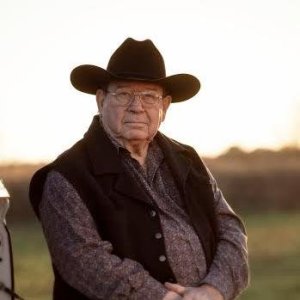 I’d known of Dusty since I was a teenager. I’d worked an FFA rodeo once in I think it was tenth grade, and Dusty was the announcer. He was a local celebrity even then, appearing on a regional morning show, doing the farm report. He’d been a biology teacher at my alma mater, Huntsville High School, as well as a field man for Tyson, traveling around to the chicken farms, helping them raise better chickens.
I’d known of Dusty since I was a teenager. I’d worked an FFA rodeo once in I think it was tenth grade, and Dusty was the announcer. He was a local celebrity even then, appearing on a regional morning show, doing the farm report. He’d been a biology teacher at my alma mater, Huntsville High School, as well as a field man for Tyson, traveling around to the chicken farms, helping them raise better chickens.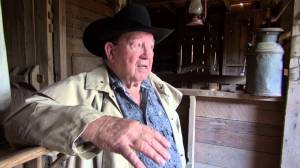 he could be, she was the only one who could control him, the only one who could rein him in. She was a quiet influence in his life, his bride of fifty-six years. While he was the center of attention, Pat would sit off to the side, reading her romance novels, the only kind I ever saw in her hands. Bodice rippers, as they’re known. She loved them, but I never really heard her talk about them.
he could be, she was the only one who could control him, the only one who could rein him in. She was a quiet influence in his life, his bride of fifty-six years. While he was the center of attention, Pat would sit off to the side, reading her romance novels, the only kind I ever saw in her hands. Bodice rippers, as they’re known. She loved them, but I never really heard her talk about them.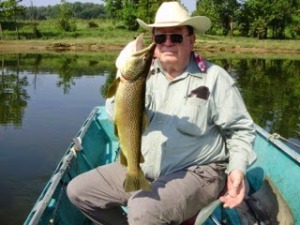 “You take this,” he said. “Use it for whatever you need. Don’t worry about paying me back for it.”
“You take this,” he said. “Use it for whatever you need. Don’t worry about paying me back for it.” my best to step into Dusty’s shoes and encourage new writers, do my best to help them set their feet on the path he helped so many travel, including me.
my best to step into Dusty’s shoes and encourage new writers, do my best to help them set their feet on the path he helped so many travel, including me. Hold a spot for me at that campfire. I want to hear more stories.
Hold a spot for me at that campfire. I want to hear more stories.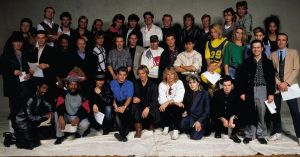 shall remain nameless, goes wall-to-wall, twenty-four-hour with holiday cheer. I avoid it like the plague). The station I’ve been listening to the most plays classic hits, so naturally, one of those songs during this season is
shall remain nameless, goes wall-to-wall, twenty-four-hour with holiday cheer. I avoid it like the plague). The station I’ve been listening to the most plays classic hits, so naturally, one of those songs during this season is Aid, the heavy metal charity song organized by Ronnie James Dio—and thought it was okay. I mean, I was into metal at the time, so anything that smacked of pop music was too commercial, even if it was put together by Bob Geldof.
Aid, the heavy metal charity song organized by Ronnie James Dio—and thought it was okay. I mean, I was into metal at the time, so anything that smacked of pop music was too commercial, even if it was put together by Bob Geldof. starving kids really look. Evidently, someone somewhere in some marketing department said, “Yeah, that one there? The one that has flies in its eyes and the skinny arms and big belly? He looks too pathetic. Now that one, the one who can still stand up? Use that one. It’ll elicit more sympathy.”
starving kids really look. Evidently, someone somewhere in some marketing department said, “Yeah, that one there? The one that has flies in its eyes and the skinny arms and big belly? He looks too pathetic. Now that one, the one who can still stand up? Use that one. It’ll elicit more sympathy.” Yes, I’m poking fun. A quick Google search reveals that it apparently does snow in parts of Ethiopia, so I’m kind off-point here, but I’m honest enough to admit it. Even so, when you picture Africa, do you picture snow? As I thought about this, I thought it might be more common for it to snow in South Africa, but I doubt snow is commonplace on the continent at large, so my dig at the song still applies, in my mind. After all, they’re addressing Africa itself in that particular lyric, right?
Yes, I’m poking fun. A quick Google search reveals that it apparently does snow in parts of Ethiopia, so I’m kind off-point here, but I’m honest enough to admit it. Even so, when you picture Africa, do you picture snow? As I thought about this, I thought it might be more common for it to snow in South Africa, but I doubt snow is commonplace on the continent at large, so my dig at the song still applies, in my mind. After all, they’re addressing Africa itself in that particular lyric, right?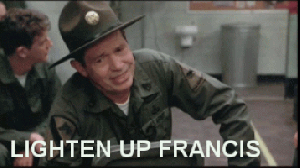
 enjoy something from our past only to wonder what in the world we saw in it. One of those items for me is the series The Dukes of Hazzard, a show I watched avidly as a young teen, though interest in it waned as I grew older—and as the show began to outlive its original creativeness. I don’t think I watched hardly any episodes after John Schneider and Tom Wopat—Bo and Luke Duke, respectively—briefly left the show to be replaced by their cousins… who also happened to have blond and brown hair. I can’t even remember the cousins’ names, which is probably just as well.
enjoy something from our past only to wonder what in the world we saw in it. One of those items for me is the series The Dukes of Hazzard, a show I watched avidly as a young teen, though interest in it waned as I grew older—and as the show began to outlive its original creativeness. I don’t think I watched hardly any episodes after John Schneider and Tom Wopat—Bo and Luke Duke, respectively—briefly left the show to be replaced by their cousins… who also happened to have blond and brown hair. I can’t even remember the cousins’ names, which is probably just as well. Way back longer ago than even the Dukes, a movie came out called The Life and Times of Grizzly Adams, starring Dan Haggerty in the title role. Mr. Haggerty—according to what I found about him on Wikipedia—led quite an exciting life, being an animal wrangler for many movies. Like the character he played in the movie—and the later TV series—he had a way with animals.
Way back longer ago than even the Dukes, a movie came out called The Life and Times of Grizzly Adams, starring Dan Haggerty in the title role. Mr. Haggerty—according to what I found about him on Wikipedia—led quite an exciting life, being an animal wrangler for many movies. Like the character he played in the movie—and the later TV series—he had a way with animals. who later played Uncle Jesse on The Dukes of Hazzard)? What, exactly, did he do? He visits Grizzly on a regular basis, always griping at and threatening the mule he called Old Number 7—because that was his seventh mule, presumably—a pack animal he never rode, and whose character evidently existed solely to bring supplies from down below to Grizzly—and provide some comic relief.
who later played Uncle Jesse on The Dukes of Hazzard)? What, exactly, did he do? He visits Grizzly on a regular basis, always griping at and threatening the mule he called Old Number 7—because that was his seventh mule, presumably—a pack animal he never rode, and whose character evidently existed solely to bring supplies from down below to Grizzly—and provide some comic relief. That love was only enhanced later when I saw movies like Jeremiah Johnson and The Mountain Men, and even the recent movie The Revenant.
That love was only enhanced later when I saw movies like Jeremiah Johnson and The Mountain Men, and even the recent movie The Revenant. sucker for good artwork. Most of the cards my family received during the seventies were very atmospheric—sleighs, snow-laden trees, houses covered with snow, their windows glowing buttery yellow with warm light. Some had actual glitter on them to make them sparkle, and I can still remember their rough texture under my fingers. Wreaths adorned them, and so did Santa in hundreds of poses—though usually laughing, sometimes with kids around him, sometimes standing in a room lit only by flames in the fireplace as he ate milk and cookies left out by the more thoughtful families.
sucker for good artwork. Most of the cards my family received during the seventies were very atmospheric—sleighs, snow-laden trees, houses covered with snow, their windows glowing buttery yellow with warm light. Some had actual glitter on them to make them sparkle, and I can still remember their rough texture under my fingers. Wreaths adorned them, and so did Santa in hundreds of poses—though usually laughing, sometimes with kids around him, sometimes standing in a room lit only by flames in the fireplace as he ate milk and cookies left out by the more thoughtful families. I hope you have a Merry Christmas, full of joy and love…
I hope you have a Merry Christmas, full of joy and love… As a human being, seeing all these sexual assault cases in the news lately is… disheartening to say the least.
As a human being, seeing all these sexual assault cases in the news lately is… disheartening to say the least. am… I don’t even know a strong enough word to convey my feelings.
am… I don’t even know a strong enough word to convey my feelings. But here’s the thing: to continue with my example, let’s say the Matt Lauer thing goes to court, and it’s clearly shown he was innocent. What then? His reputation is already besmirched because we’ve convicted him in the People’s Court of Social Media. He can’t get a job doing anything remotely like he was doing when NBC fired him sight unseen. Because the People’s Court of Social Media never closes. It’s open 24/7, and there’s no lack of people out there who will disbelieve any amount of evidence they’re shown (witness Flat Earthers, if you doubt).
But here’s the thing: to continue with my example, let’s say the Matt Lauer thing goes to court, and it’s clearly shown he was innocent. What then? His reputation is already besmirched because we’ve convicted him in the People’s Court of Social Media. He can’t get a job doing anything remotely like he was doing when NBC fired him sight unseen. Because the People’s Court of Social Media never closes. It’s open 24/7, and there’s no lack of people out there who will disbelieve any amount of evidence they’re shown (witness Flat Earthers, if you doubt).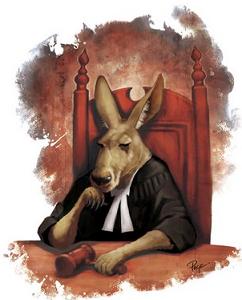 next person could be you.
next person could be you.



 Consider: you have the Trumpites (Trumpets?), who seem to be the majority on the Republican side of things at the moment. Of course, in political terms, it’s a long, long time till November, so anything can happen by the time the election comes around, but right now he seems to be the one riding the wave. I think it interesting—and a bit disturbing—that the Republican leadership differs with their members on this one, as they don’t like the man. Do they know more than the average Republican voter? Who knows? But one thing is for sure: it’s a disturbing trend—and reflective of a larger issue I see in our government in general—that they are determined not to listen to their constituents on this matter.
Consider: you have the Trumpites (Trumpets?), who seem to be the majority on the Republican side of things at the moment. Of course, in political terms, it’s a long, long time till November, so anything can happen by the time the election comes around, but right now he seems to be the one riding the wave. I think it interesting—and a bit disturbing—that the Republican leadership differs with their members on this one, as they don’t like the man. Do they know more than the average Republican voter? Who knows? But one thing is for sure: it’s a disturbing trend—and reflective of a larger issue I see in our government in general—that they are determined not to listen to their constituents on this matter. before him: as a Canadian born to an American mother, does he have the right to even be president? This has plagued Obama for his entire eight-year stint, and will likely follow him to his grave. I imagine the same will happen to Ted Cruz, should he win. Or, for that matter, should he lose the nomination or bid for the presidency. Talking heads will no doubt point to this as a major factor in his defeat—along with the fact he has the gall to actually be religious.
before him: as a Canadian born to an American mother, does he have the right to even be president? This has plagued Obama for his entire eight-year stint, and will likely follow him to his grave. I imagine the same will happen to Ted Cruz, should he win. Or, for that matter, should he lose the nomination or bid for the presidency. Talking heads will no doubt point to this as a major factor in his defeat—along with the fact he has the gall to actually be religious. The Rubiomites seem to have a hard row to hoe, as Rubio has flip-flopped on some issues—especially illegal immigration—about as much as John Kerry flip-flopped on our Middle Eastern ventures. He seems to have earned his sobriquet of being a RINO (Republican In Name Only), at least if you ask a Trumpite or a Cruzerian.
The Rubiomites seem to have a hard row to hoe, as Rubio has flip-flopped on some issues—especially illegal immigration—about as much as John Kerry flip-flopped on our Middle Eastern ventures. He seems to have earned his sobriquet of being a RINO (Republican In Name Only), at least if you ask a Trumpite or a Cruzerian. the first black president with the first woman president, which is fuzzy logic at best. But then, politics and logic rarely coincide. In fact, I was once derided on Facebook for uttering the blasphemous phrase Logic dictates. Apparently the commenter thought making decisions based on knee-jerk reactions (PATRIOT Act, anyone?) and emotions was a much better method than examining facts to make an informed choice. But I digress. Much like the Cruzerians, the Hillaryans have to face the fact their candidate is (yet again) under investigation for something. But hey, since when has a scandal meant anything in American politics?
the first black president with the first woman president, which is fuzzy logic at best. But then, politics and logic rarely coincide. In fact, I was once derided on Facebook for uttering the blasphemous phrase Logic dictates. Apparently the commenter thought making decisions based on knee-jerk reactions (PATRIOT Act, anyone?) and emotions was a much better method than examining facts to make an informed choice. But I digress. Much like the Cruzerians, the Hillaryans have to face the fact their candidate is (yet again) under investigation for something. But hey, since when has a scandal meant anything in American politics? And last but not least, there is the Church of Bernie, where any day now, he will usher in a utopia where there’s all kinds of free stuff and the lions will lie down with the lambs and all that. I wouldn’t say they’re any worse than the others—after all, I don’t support any of the current crop—but they do seem the least pragmatic, since it’s pretty easy to see nothing is free. But I’m not here to argue policy, and saying he’s the least pragmatic is like saying his shit stinks less: it really doesn’t matter, cuz it’s all crap.
And last but not least, there is the Church of Bernie, where any day now, he will usher in a utopia where there’s all kinds of free stuff and the lions will lie down with the lambs and all that. I wouldn’t say they’re any worse than the others—after all, I don’t support any of the current crop—but they do seem the least pragmatic, since it’s pretty easy to see nothing is free. But I’m not here to argue policy, and saying he’s the least pragmatic is like saying his shit stinks less: it really doesn’t matter, cuz it’s all crap. believe, but in the fervency of that belief. They absolutely refuse to entertain any viewpoint but their own—much like, say, Christians and Muslims, to use just two examples—and if you dare suggest anything different, they yell at you and call you names. And when you point out the fallacy of their argument by stating facts and figures—or simply point out that what they’re spouting is an opinion and they haven’t backed it up with fact—they go silent. I don’t know if they’re pouting or what.
believe, but in the fervency of that belief. They absolutely refuse to entertain any viewpoint but their own—much like, say, Christians and Muslims, to use just two examples—and if you dare suggest anything different, they yell at you and call you names. And when you point out the fallacy of their argument by stating facts and figures—or simply point out that what they’re spouting is an opinion and they haven’t backed it up with fact—they go silent. I don’t know if they’re pouting or what. The bottom line is, the hate and vitriol I see both sides spewing is very much reminiscent of religion. I saw a meme on Facebook positing that anyone who is against Obama is not only a racist, but also a victim of genetically inherited ignorance. This was put out by Occupy Democrats. I have no idea how radical they may be, but if this is one of their beliefs, I’d say fairly radical. My first thought on reading this was to wonder if they were going to start espousing their own form of eugenics at some point in the future. You know, instead of eliminating “inferior” races, just eliminate those with genetically inherited ignorance, or at least decide they can’t vote.
The bottom line is, the hate and vitriol I see both sides spewing is very much reminiscent of religion. I saw a meme on Facebook positing that anyone who is against Obama is not only a racist, but also a victim of genetically inherited ignorance. This was put out by Occupy Democrats. I have no idea how radical they may be, but if this is one of their beliefs, I’d say fairly radical. My first thought on reading this was to wonder if they were going to start espousing their own form of eugenics at some point in the future. You know, instead of eliminating “inferior” races, just eliminate those with genetically inherited ignorance, or at least decide they can’t vote.